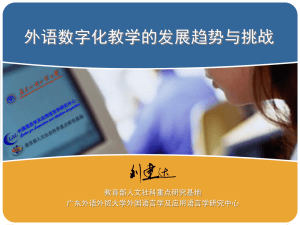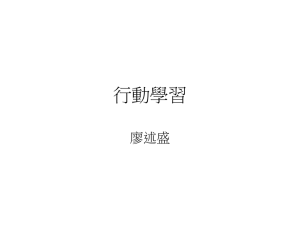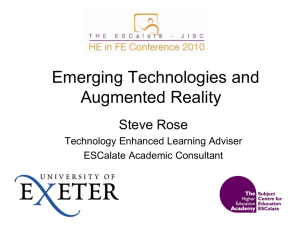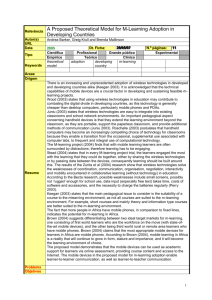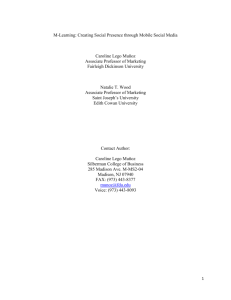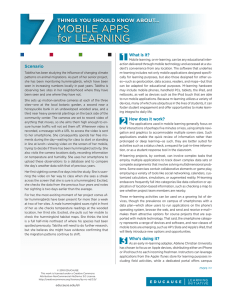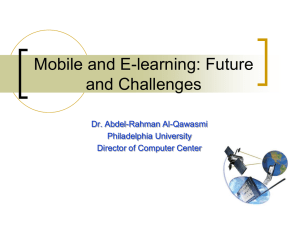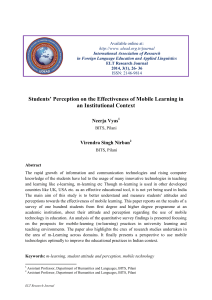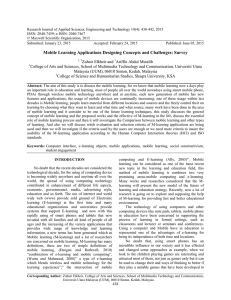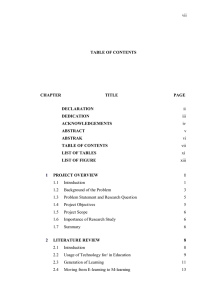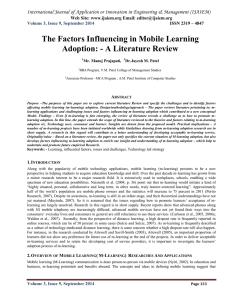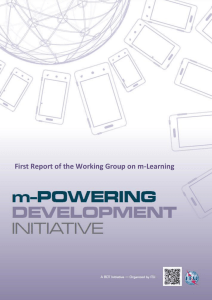m-Learning Working Group overview Report for m-Powering Development Advisory Board,
advertisement
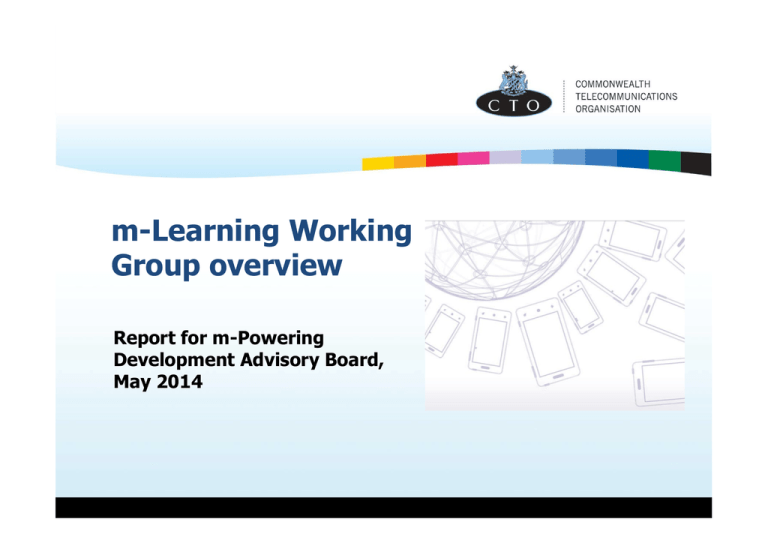
m-Learning Working Group overview Report for m-Powering Development Advisory Board, May 2014 Those involved • Members drawn from mPowering Development Initiative Advisory Board: – Tim Unwin (Chair) (CTO) – Tayfun Acarer (President of the ICTA, Turkey) – David Atchoarena (UNESCO) – Anne Bouverot (GSMA) – Anthony Bloome (USAID) – John E, Davies (Intel) – Omobola Johnson (Minister of Communication Technology, Nigeria) – Veena Rawat (RIM) – Binali Yikdirim (Minister of Transport, Maritime Affairs and Communications, Turkey) • Invited members with external expertise – Roz Gater (DFID) – Simon Milner (Facebook) – Mike Trucano (World Bank) • Colleagues supporting members of the Advisory Board – Ahmet E. Cavusoglu (Turkey) – Belinda Exelby (GSMA) – Florence Gaudry-Perkins (Alcatel-Lucent) – Adrian Godfrey (GSMA) 2 Outline of report • Context • Successful/Promising initiatives • Stakeholders involved in m-learning • Good practices • Gaps and challenges • Recommendations • Annexes 3 Six key principles underlying our work 1. Should not seek to replicate existing initiatives, but should identify the relevant gaps where the ITU has a competitive advantage. 2. It recognises a diversity of views and opinions, 3. It should promote good practices, which can then be localised and adopted in particular contexts 4. m-Learning, is but one aspect of a wider field of e-learning/ education, and many of the principles of good practice in the latter are relevant to m-Learning. 5. The “m” is being used to refer to all kinds of education and learning undertaken through the use of mobile devices • most commonly mobile-‘phones and tablets, but also including laptops and other devices where appropriate. 6. The Working Group should at this stage be as inclusive as possible in its recommendations, recognising that the concepts of m-Education and m-Learning are subtly different 4 Ways of judging m-learning success criteria • • • • • • • • • • • Enhanced learning outcomes, differentiated by subjects of study; Value for money with respect to alternative modes of learning; Scale and number of users; Increases in the quantity and quality of learning materials/ educational software available for mobile platforms; Attainment of relevant skills for employment, focusing especially on collaborative learning and assessment. Numbers of devices sold or rolled out to learners; Enhanced levels of Internet use, and thus revenue for ISPs and mobile operators; Enhanced use of education-based value-added services; Enhanced literacy and numeracy skills; Increase in employability of learners; Sustainability and funding mechanisms. 5 Exciting initiatives • Agastya Mobile Labs (http://www.agastya.org/how/how-we-do-it/mobile-labs) • BBC Janala – mobile phones for adult literacy (Bangladesh) (http://www.bbcjanala.com/) • Dr Math (http://mathforum.org/dr.math/) • Mobiles for Education Alliance (www.meducationalliance.org) • Nokia Life Tools (http://www.nokia.com/in-en/support/faq/?action=singleTopic&topic=FA132357) • Tangerine technology, RTI (http://www.tangerinecentral.org/) • Text2Teach, Philippines (http://www.text2teach.org.ph/) • UNESCO’s Mobile Learning work (http://www.unesco.org/new/en/unesco/themes/icts/m4ed/) • Urban Planet Mobile (http://www.urbanplanetmobile.com/what-we-do) • Worldreader (http://www.worldreader.org/) • Yoza (http://yozaproject.com/) 6 Stakeholders • Main groups of stakeholders, each with their own interests – International organisations – National governments and public sector – Private sector companies – Civil society organisations – Educational and research institutions and staff – Citizens – Partnership organisations/brokers • Hence, importance of adopting a holistic and collaborative approach 7 Emerging good practices • Focus on learning outcomes not technology • Involve teachers and users at all stages from design to implementation and review • Consider sustainability, maintenance and financing right at the beginning • Think holistically and systemically • Ensure that all relevant government Ministries and Departments are involved • Ensure equality of access for all learners, especially those who are marginalised (particularly those with disabilities and those without access to existing education systems). • Appropriate and rigorous monitoring and evaluation must be in place • Involve participatory approaches in design so as to ensure that adoption of technology is user-centric 8 Main gaps and challenges • The imperative of ensuring joined up approaches across Governments • Open Platforms for sharing mobilelearning content • Effective and Rigorous Monitoring and Evaluation • Sharing contextualised examples of good practices • Affordability • Connectivity • Creation of really effective multistakeholder partnerships • Lack of relevant content 9 Four main conclusions 1. A very considerable amount of research and practice has already been done in the field of m-Learning and m-Education; 2. Despite the lack of high quality and rigorous monitoring and evaluation, there is widespread recognition of the potential of mLearning to improve delivery of education and skills acquisition; 3. There already exist major international initiatives in the field of m-Learning and mEducation; and 4. We are still in the relatively early days of the use of mobile devices in learning and teaching, and developments are moving very quickly 10 Four areas of possible m-Powering Development activity 1. Support and advocacy for the fundamental importance of appropriate monitoring and evaluation of mLearning and m-Education initiatives 2. Enhanced understanding by Governments of the essential need for all mobile initiatives to be approached in a holistic manner, involving all relevant Ministries and partners 3. Support for an environment for sharing and showcasing good practices in m-Learning as part of a wider m-Powering Development online resource 4. Support for the creation of an Open mobile app to provide for free sharing of m-Learning content, as well as the dissemination of commercial resources 11 Still a long way to go! 12
